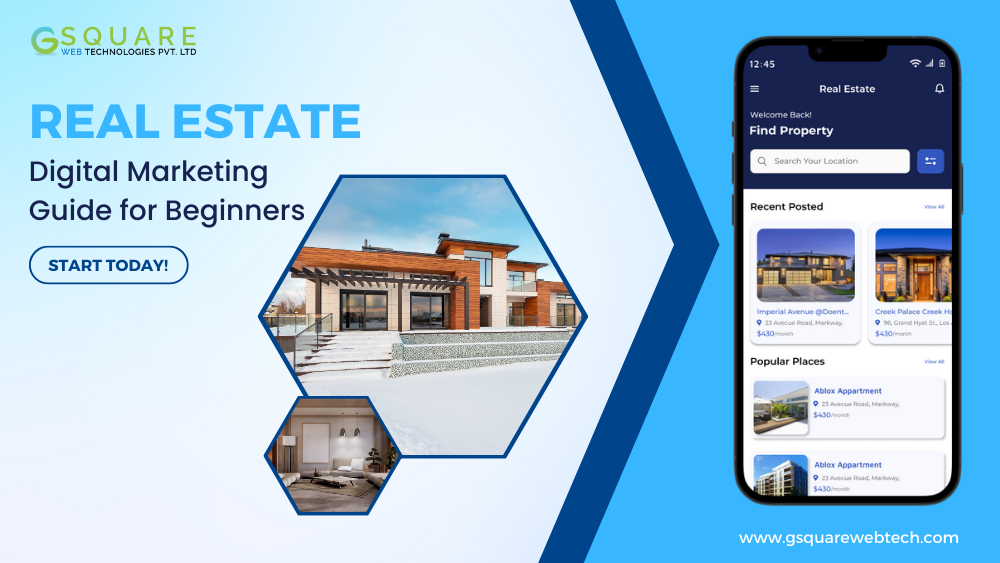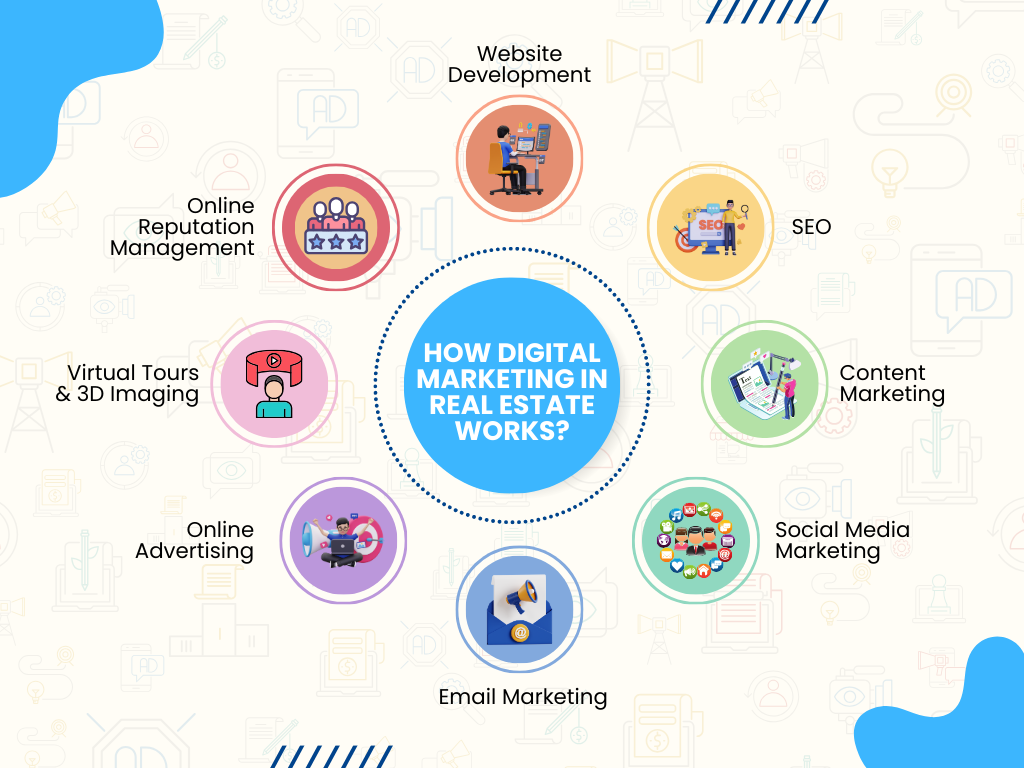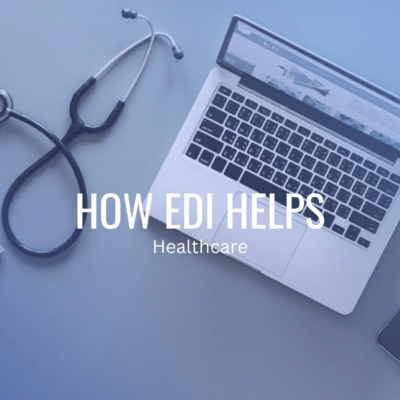
Real Estate Digital Marketing Guide for Beginners
We are living in the era of Marketing! Where no business can survive without promoting their product/service. Nowadays, due to the rapid rise in technological innovations, everyone is utilizing digital means to power their marketing strategies. These practices are contributing to the demand for digital marketing that is growing at an unprecedented rate. A marking that is done through digital sources is known as Digital Marketing. It is being used in every industry and the scenario is not different in the Real Estate Sector. Now, more people tend to view the property virtually before the on-site visit and visionary builders and agents are utilizing online ways to introduce new-property-sale-offers and boost their earnings.
Recently released data shows that 97% of all homebuyers use the internet to search their home. This trend shows the importance of Digital Marketing helps builders and agents sell their properties rapidly and with significant margins. If you are a builder or agent looking to sell a property utilizing online means then you are at the right place. In this guide, we will learn how you can utilize digital marketing to sell properties online without being a marketing expert. So, without wasting any time let’s get started.
What Is Real Estate Digital Marketing?
As we have seen, Digital Marketing is a process of utilizing digital means to promote any product or service. When these means are used to promote and boost the sale of a property then it is called Real Estate Digital Marketing. So, we can say that REDM is a process, where digital channels are used to reach the real estate target audience. In this process, several digital platforms and strategies are utilized to promote and sell real estate properties.
It leverages the power of the internet and technology to reach a wider audience. From local to global, At every stage digital marketing is capable of generating leads and attracting potential buyers and renters. Remember, real estate digital marketing is not a narrow domain but comprises a wide range of techniques and tools to bring promised success to builders and agents.
How Digital Marketing in Real Estate Works?
The whole concept of digital marketing in real estate is based on lead generation. There are Brokers and Builders the main players who want leads. Lead means a potential buyer who is looking for a property and ready to pay an amount (e.g. A person looking for 2BHK and ready to pay 40 Lac for it, will be a lead if using digital means we reach him/her). There are several hundred thousand people who are looking for properties to buy, they may looking for a home, shop, plot, flat, etc.
Process of Targeting
Now, by utilizing digital marketing we can target those buyers. For that, we can use Google Ads, Social Media Ads, and other channels of digital marketing (you will read about them below). Via these channels, we can target buyers on the basis of their paying capacity. For instance, we will only target those buyers who can pay more than 1 crore for a property that is for sale for 1 crore rupees.
In this case, the leads that can pay even up to 70 to 80 Lac are not our target audience. However, we can transfer those leads to our other projects or sell them to other builders/ brokers looking to sell properties in that particular range.
Digital Marketing Channels to Help Generate Real Estate Leads?
As we discussed earlier, there are several digital marketing channels that can be utilized to target buyers of any specific paying potential range and for any specific location. The list of these channels is below:

- Website Development
Developing a well-designed and user-friendly website is a must to start the journey of digital marketing for real estate projects. It will work like an online shop where all buyers will come to find the project and have its first look.
Real estate agents, agencies, and property developers must have a website before they start targeting buyers using digital means. Websites allow them to showcase available properties, provide information about their price range, and capture leads through contact forms.
- Search Engine Optimization (SEO)
Developing a website is like opening a shop online, so now you need some customers to visit the shop right? For that, we perform SEO, which stands for search engine optimization. That means arranging your website content in a way that it becomes attractive.
Just like you make your real estate office attractive with lots of offers, SEO makes your website attractive with quality arrangements, so that search engines like Google, which have a huge number of potential buyers, can show your website at the top. This is how SEO techniques (you will read about them below) improve your website’s online visibility to allow buyers to see it and visit it to find the properties you are selling.
As you are not alone in trying to reach the first page of Google or other Search Engines’ SERPs (Search Engine Results Pages), SEO requires enormous efforts. For that reason, it is necessary to generate website content, meta tags, and other on-page elements that help in ranking higher on SERPs for relevant keywords.
- Content Marketing
After SEO, content marketing is another way to attract leads. As we know it is necessary to poke the potential buyers regularly and provide them with attractive offers. For that reason, regular valuable and informative content creation such as blog posts, articles, videos, and infographics related to the real estate market is necessary.
It helps real estate businesses establish authority, attract potential buyers, and improve website engagement. Visitors can become loyal readers and convert into or bring potential buyers.
- Social Media Marketing
Social Media Marketing is another section of digital marketing. Due to the rapid growth of Social Media and its impact, real estate professionals can now leverage social media platforms like Facebook, Instagram, Twitter, and LinkedIn to reach a wider audience, share property listings, and engage with potential clients.
Social Media Marketing can be done in both ways ‘paid and organic’ to attract potential leads. Paid advertising brings quick results and helps target specific customers on these platforms, that’s why common nowadays.
- Email Marketing
Through, email marketing, it’s easier to generate more leads and engage clients by keeping them informed about new listings, market updates, and other relevant information.
These email campaigns are highly personalized, so that effective in the real estate industry. Email marketing is one of the most commonly used marketing strategies in the digital marketing domain.
- Online Advertising
This is another way to promote real estate projects. Online advertising through platforms like Google Ads or social media advertising, however expensive, can help real estate professionals reach a specific audience.
Keep in mind, that these ad campaigns are efficient in targeting users based on location, demographics, and interests, increasing the chance of getting more qualified leads.
- Virtual Tours and 3D Imaging
In this busy world, no one has enough time to visit several properties so they postpone the idea of buying until they find a good property. Digital marketing can offer them technology like virtual tours, 3D imaging, and drone photography to provide potential buyers with amazing experiences of properties before their visit.
These impressive images and virtual tours compel them to visit the location which could bring potential leads. On top of that, this particular technology could also efficiently target remote or international buyers.
- Online Reputation Management
Like business reputation in the market matters, it is essential to manage their online reputation. Online reviews and ratings on platforms like Google My Business and Yelp have become significant these days and can impact a real estate professional’s reputation. Digital marketing helps in managing and responding to reviews and pushes them towards positive responses.
How Digital Marketing For Real Estate Agents Starts?
Now after learning the channels and basic details about Real Estate Digital Marketing, let’s learn how Real Estate Agents can start Digital Marketing.
1. Learn the Basics
They can start by learning the basics after having a website (they can hire experts to build a website) Once have a good website they can start digital marketing. They can write blogs and upload property-for-sale images embedded with contact forms. However, hiring a digital marketing agency is a good idea here, but still, they can (if want to) perform SEO-SMM-related tasks on their own. The process to follow is mentioned below.
2. Prioritize Local SEO
Generally, potential property buyers are the local residents. To target them real estate professionals should focus on local SEO. To ensure your legitimacy you must have your accurate address and name flash on your across the web.
3. Get Listed in Web Directories
Local web directories are one of the best tools to get rapid attention. Listing in these directories, lets the real estate professionals get regular leads. Additionally, these listings allow their website to increase rankings for local keywords across search engines.
4. Create Content to Target Locals
To attract local customers and grab their longer attention spans, professionals can publish local-specific content to their websites, social media handles, and other online channels. This content can be based on solving their problems and real estate product reviews, whatever performs better. Local content ranks higher and less competitively.
5. Do Keyword research
This is the most essential part. Do keyword research to know what people are searching for finding properties around them or in remote areas. Real estate professionals can use Semrush or Ubersuggest, like professional tools to do effective and accurate keyword research.
Popular Digital Marketing Tools for Real Estate
- AdWords
By helping to create highly targeted ads, AdWords plays a crucial role in local SEO. It makes it easier for businesses to target any of the specific locations including their local area. They increase their visibility by connecting with people nearby searching for relevant keywords and services.
- Ubersuggest
Ubersuggest provides keyword insights that help real estate professionals discover relevant local keywords. These keywords help optimize their website and content. By understanding the local search intent, professionals can create content that meets with demands of their local customers. It drives more organic traffic to their site and helps increase qualified leads.
- Google Search Console/Webmaster
Google Search Console helps real estate professionals find how their website is performing in search results. It offers essential insights to identify and fix SEO issues (for local, and global both). It also provides data on local queries and allows the admin to submit sitemaps for better indexing.
- Google Analytics
Google Analytics is used for tracking website traffic and user behavior. It helps admins understand how visitors engage with the website and what is the bounce rate. By studying this data admin can make necessary changes, enabling them to improve SEO.
- Google Trends
Google Trends is another tool of digital marketing used to explore trending topics and search queries in a specific area. This information can help real estate professionals build a content strategy that resonates with local trends. This practice ensures their content remains relevant and appealing to the local audience.
- Ahrefs
You can use Afrefs for comprehensive backlink analysis. This is crucial for local SEO and helps the website boost its ranking. You can analyze the backlink strategy of your competitors find opportunities for building high-quality local backlinks and improve the authority of your website in local search.
- SEMrush
SEMrush is Another popular tool to do in-depth competitive analysis and keyword research. It helps monitor the local keyword rankings of your website and track its competitors in your area. After analyzing you can change local SEO strategy accordingly.
Real Estate Digital Marketing Strategy & Cost
Below is the strategy Real Estate Agents can follow for effective Digital Marketing.
Step 1: Optimize Social Media Handles and post engaging content on a daily basis.
Step 2: Optimize your website and update it regularly with the latest offerings and keep it up to date.
Step 3: Attach the content form to every digital means, including on the website, social media handles, and ad campaigns.
Step 4: Run Target ad campaigns, We recommend you hire a PPC ads expert to target the buyers efficiently. They can guide you what is the best time to run a particular ad. Remember, ads running is an expensive business do it wisely.
Step 5: Take every generated lead seriously and hire an expert sales team to convert leads into closing ones.
Repeat the process!
Conclusion
All in all, Digital Marketing is penetrating the Real Estate business rapidly. You have to learn it or hire experts to stay it if you want to be in the business for long. Read this article again (if needed) to learn and perform the marketing task efficiently and increase your revenue in many folds.
FAQs
1. Why Does Real Estate Digital Marketing Matter?
Real Estate Digital Marketing is crucial because it increases your reach to a wider audience and boosts sales by utilizing online means.
2. How does Digital Marketing in Real Estate work for lead generation?
It targets potential buyers using Google Ads, social media ads, etc., based on preferences and paying capacity to efficiently generate leads.
3. What are the main digital marketing channels in Real Estate?
Key channels include website development, SEO, content marketing, social media, email, online ads, virtual tours, and online reputation management.
4. How can Real Estate Agents start with Digital Marketing?
Begin by creating a user-friendly website, focusing on local SEO, listing in directories, creating local content, and doing keyword research.
5. What are popular digital marketing tools for Real Estate?
Popular tools include AdWords, Ubersuggest, Google Analytics, Ahrefs, SEMrush, and Google Trends for improving online presence and visibility.





